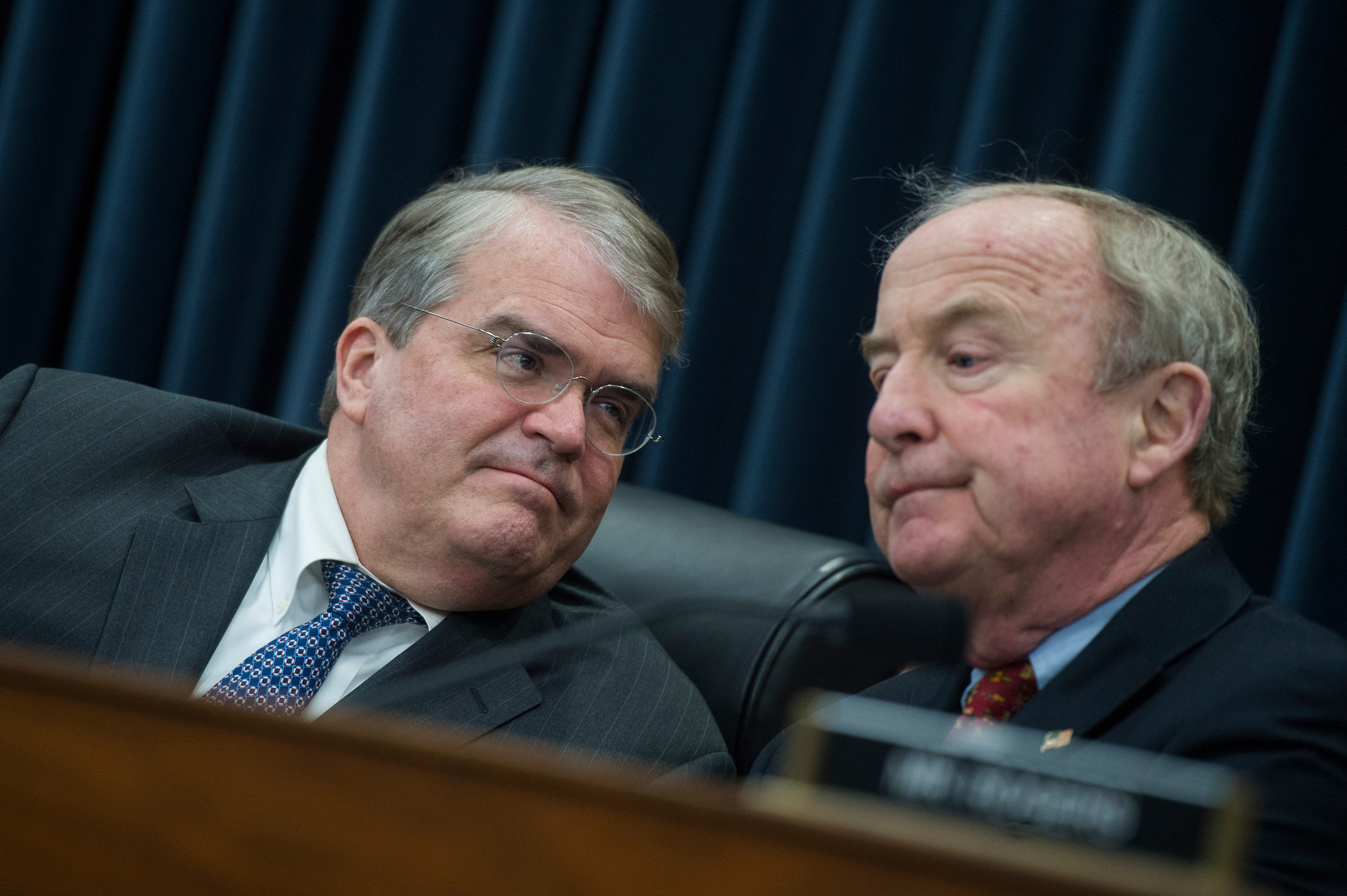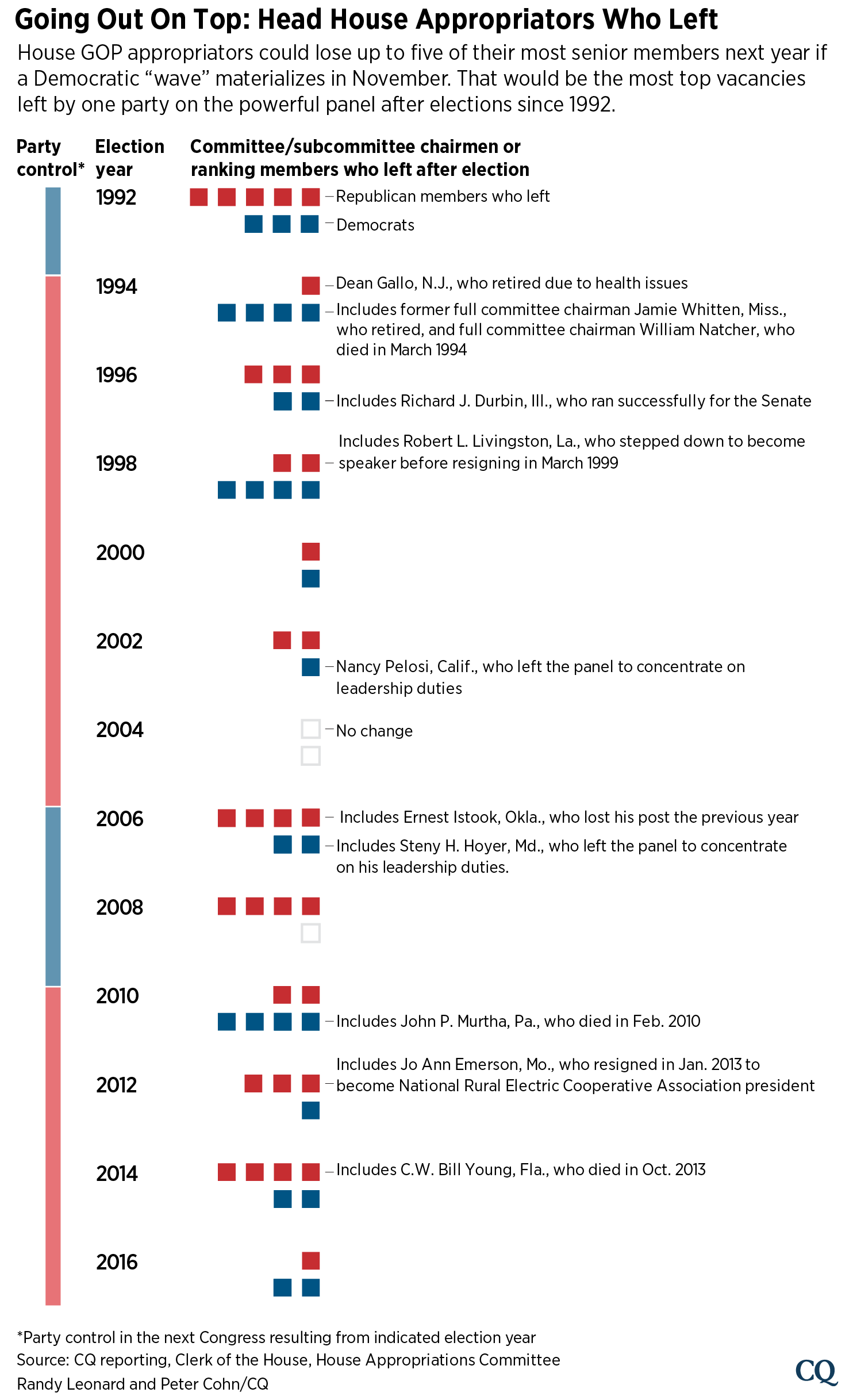House GOP Appropriators Facing Steep Turnover in 116th Congress
Both parties have endured upheaval in wave elections in the past

A Democratic “wave” this November, should one materialize, could result in the departure of as many as five senior House Republican appropriators, which would mark the biggest wipeout of major players from one side of the dais in 26 years.
Three subcommittee “cardinals” are facing tough re-election fights this November: Commerce-Justice-Science Chairman John Culberson and Military Construction-VA Chairman John Carter, both of Texas, and Homeland Security Chairman Kevin Yoder of Kansas.
Meanwhile, full committee Chairman Rodney Frelinghuysen, R-N.J., who in his 12th term had been facing difficult electoral conditions, is retiring after this session. Former Military Construction-VA Subcommittee Chairman Charlie Dent, R-Pa., didn’t want to wait that long; he resigned in May.
House Republicans last had five senior members leave Appropriations after the 1992 elections, three due to retirements.
Culberson and Yoder’s seats are listed as “in play” by Inside Elections with Nathan L. Gonzales. Culberson is in the danger zone “tilt Republican” category, while Gonzales has Yoder in the slightly safer, but not out of the woods, “lean Republican” column. Carter’s seat is considered much safer, but he faces a strong challenger who could surprise in a wave year.
“I think Republicans, especially moderate Republicans, have to walk a very tight line,” said former Rep. James T. Walsh, R-N.Y., a veteran appropriator who retired after the 2008 elections, which saw Democrats pad their House majority by 21 seats. “Moderate Republicans cannot embrace President [Donald] Trump for a number of reasons. On the other hand, they represent tens of thousands of people who absolutely do embrace President Trump.”
In Culberson’s district, which includes the Houston suburbs, Hillary Clinton beat Trump in 2016 by 1.4 percentage points. Culberson won that district with 58 percent of the vote during 2016 — a stark decline from the 73 percent he received during his first general election in 2000.
Culberson also manages one of the more perennially difficult spending bills, with the Justice Department budget in particular a likely target for Democratic messaging amendments. House GOP leaders appear likely to keep the $62.5 billion fiscal 2019 Commerce-Justice-Science measure (HR 5952) off the floor until after the midterms, which could help Culberson keep his campaign focus on his district rather than Trump’s Twitter feed.
Clinton’s victory margin in Yoder’s district was also tight, at 1.2 percentage points. Yoder had a close call during the 2016 election cycle as well, receiving 51.3 percent of the vote, his worst showing since being elected in 2010 for the first time with 58 percent.
‘Huge dilemma’
Walsh, who is now a lobbyist at K&L Gates, said Republicans from “purple” districts will have a difficult time separating themselves from administration policies that may not be popular with swing voters.
“It’s a huge dilemma,” Walsh said. “Stylistically, his administration is very difficult to deal with for Republicans in moderate districts, so they have to be able to separate policy from presidential politics.”
That could be particularly difficult for Yoder, who is shepherding the $51.4 billion fiscal 2019 Homeland Security bill that includes $5 billion for Trump’s U.S.-Mexico border wall. GOP leaders are also holding that measure back from the floor until after the midterms, hoping to avoid a showdown with Trump and Senate Democrats over a potential government shutdown that could cast a larger pall over their own party.
“We all heard the president as a candidate say, ‘We’re going to build the wall and Mexico is going to pay for it.’ And now the president is saying we’re going to have to pay for it and people don’t like that,” Walsh said. He added that Yoder managing the Homeland Security bill “sounds like nothing but a headache.”
Carter knows that firsthand as the former Homeland Security chairman, switching to the more popular and less contentious Military Construction-VA panel earlier this year after Dent’s resignation triggered a round of musical chairs. Carter’s rural Texas district appears much safer for Republicans on the surface, as he won in 2016 with 58 percent of the vote and Trump carried the district by 13 percentage points.
But Carter’s Democratic opponent, MJ Hegar, could give the eight-term lawmaker a run for his money. The former Air Force helicopter pilot earned a Purple Heart and Distinguished Flying Cross with Valor for bravery during tours in Afghanistan. Her campaign ad titled “Doors” made her a nationally recognized candidate. Hegar has also brought in more campaign money than Carter this cycle and she had more cash on hand at the end of June than the incumbent.
Institutional advantage
Even in the 1994 GOP landslide year, the panel’s Democrats lost only three of their senior members; though arguably that side lost a vast amount of institutional knowledge with the retirement of the former full committee chairman, Jamie L. Whitten of Mississippi, who held the gavel for 15 years. Whitten also was either Agriculture subcommittee chairman or ranking member for more than four decades; the Agriculture Department’s headquarters was named for Whitten in 1995 after his death. Additionally, full committee chairman William H. Natcher, D-Ky., who had been a cardinal since 1963, died in March 1994.
The House Republican victory in 2010 coincided with the retirement of full committee chairman David R. Obey, D-Wis., who was also Labor-HHS-Education chairman and had served on the committee since 1969. That year also saw the defeat of two other Democratic cardinals, while a third — Rep. John P. Murtha of Pennsylvania, a panel member since 1975 and longtime Defense subcommittee leader for the Democrats — died in February 2010.

Yoder and Dent joined the panel in 2011. Carter was appointed in 2005, and Frelinghuysen a decade earlier.
While this year could prove particularly disastrous for Republicans, turmoil on Appropriations in recent decades is not a new phenomenon. After the 2014 midterms, Republicans saw two cardinals retire and another leave Congress after running unsuccessfully for the Senate. A fourth, former full committee chairman C.W. Bill Young, R-Fla., died the previous year. Two Democratic ranking members also retired in 2014 as House Republicans grew their majority to its largest since 1929.
House Democrats’ return to power after the 2006 elections coincided with four senior Republicans stepping aside either due to retirement, defeat or unsuccessful run for higher office. The GOP lost four more subcommittee leaders after the 2008 elections, including Walsh. And four Democratic ranking members opted for retirement instead of running in 1998.
Up in the air
Walsh said Republicans generally fare better in midterm years, because while overall turnout is down, GOP voters don’t typically see the same decline in enthusiasm that Democrats do. On the other hand, some electoral analysts are predicting the lightning rod in the White House will prove to be a one-man turnout machine for Democrats.
Former Rep. Henry Bonilla, R-Texas, a former Agriculture subcommittee chairman, agreed maybe not all was as dire as some polls are indicating. Bonilla didn’t see firm parallels between this year and a dozen years ago when he lost his re-election bid amid the Democratic takeover, largely because the Trump factor itself is so unpredictable: “Who predicted that Trump was going to win?”
Bonilla, now a lobbyist with the Normandy Group, said polls might be skewed somewhat because “a lot of the times the people supporting Trump won’t say they’re supporting Trump … it’s only early August, a lot of it will start coming into play a little bit after Labor Day.”
And Bonilla knows something about unforeseen outcomes: He flipped his heavily Democratic district into the “red” column in 1992, and easily bested six Democratic challengers on Election Day in 2006.
But he failed to garner at least 50 percent of the vote, which led to a runoff the following month and a victory by ex-Rep. Ciro D. Rodriguez, who served two terms before losing in 2010. Bonilla had been forced into a special election after his district’s boundaries were redrawn again, in order to comply with a Supreme Court ruling that found a 2003 remapping by the Texas Legislature to be a violation of the Voting Rights Act.
“It’s like predicting the weather; it’s extremely difficult to say how many hurricanes we’re going to have in the next six months,” Bonilla said.





